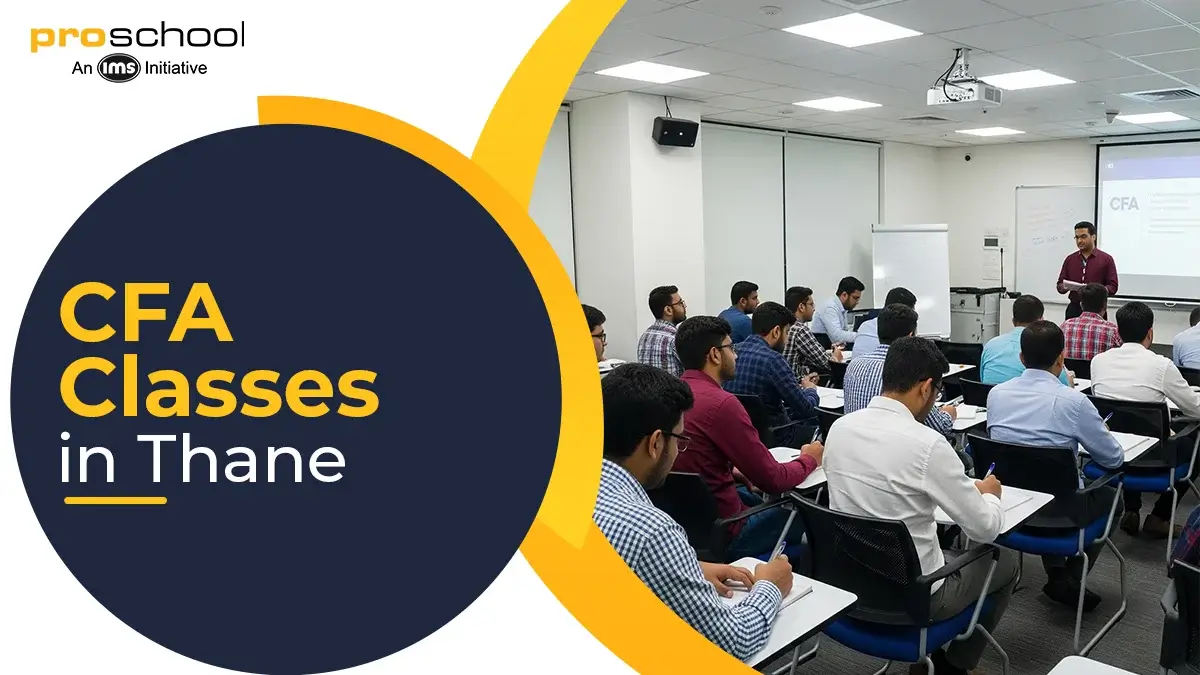How hard is it to pass the ACCA exam?

Here's What We've Covered!
- Top 11 misconceptions about ACCA in 2024
- Is ACCA Hard? Understanding the Exam Difficulty
- Is ACCA More Difficult Than CA?
- Is ACCA Challenging for Average Students?
- Is ACCA Harder Than a Degree?
- The ACCA Course Fees are very High
- ACCA professionals have no scope for growth in India
- Non-math students cannot apply for the ACCA course
- ACCA exams are purely theoretical and do not require practical application.
- Passing ACCA exams guarantees immediate career success
- Completing ACCA exams quickly is better than taking time to thoroughly understand the material
- ACCA exams are only for those pursuing a career in public accounting
- Conclusion
If you’re someone from the finance domain you must have often heard people say that facing the ACCA exams is difficult. Well, there are so many common perceptions and misconceptions about how difficult these exams are.
Some people think that they’re almost impossible to pass, while others believe they’re just another set of tests and can be easily aced with the right preparation and guidance. However, it’s important to understand what truly contributes to the difficulty of these exams.
So if you’re interested in exploring the ACCA exams or have taken them in the past and need some additional tips and tricks to ace them then this blog can be your ultimate guide. In this discussion, we’ll address questions like: Is ACCA hard? How does it compare to other qualifications like CA? Can average students succeed in ACCA? So read this further to decode answers to these questions.
Top 11 misconceptions about ACCA in 2024
-
Is ACCA Hard? Understanding the Exam Difficulty
ACCA exams are comprehensive assessments designed to evaluate candidates’ proficiency in accounting and finance. The exams are divided into modules covering various areas such as financial reporting, taxation, auditing, and management accounting and each module comprises multiple sections that necessitate proficiency across a spectrum of topics.
But you must be wondering what are the factors that contribute to the perceived complexity of ACCA exams.
- Complexity of Exam Questions: ACCA exam questions often require candidates to analyze real-world scenarios and apply theoretical knowledge. The complexity of these questions can vary, ranging from straightforward calculations to intricate case studies requiring critical thinking and problem-solving skills.
- Time Constraints: Each ACCA exam is timed which puts pressure on candidates to manage their time effectively during the exam. So the need to complete a significant number of questions within a limited timeframe can add to the perceived difficulty, especially for those who struggle with time management.
- Technical Knowledge Required: ACCA exams demand a high level of technical expertise in accounting and finance. This means that candidates need to thoroughly understand complex accounting principles, financial reporting standards, tax regulations, and auditing procedures. The depth of technical knowledge required can be daunting for some candidates, particularly those without prior professional experience in accounting or finance.
- Adaptation to Changes: The accounting and finance industry is constantly evolving with new regulations, standards, and practices being introduced regularly. ACCA exams aim to reflect these changes, which means candidates must stay updated with the latest developments in the field. Keeping pace with evolving exam content and adapting study strategies accordingly can be demanding.
- Language Proficiency: For non-native English speakers, language proficiency can pose an additional challenge. ACCA exams are conducted in English, and candidates must demonstrate fluency in reading and understanding complex technical texts. Language barriers can hinder comprehension and make it more difficult for candidates to convey their knowledge effectively in written answers.
But wait, don’t worry because here are some insights into the level of preparation and commitment required to pass ACCA exams so that you don’t end up considering it difficult:
- Successfully passing ACCA exams demands rigorous preparation and uncompromising commitment.
- Candidates must allocate significant time and resources to thorough study programs, including attending lectures, utilizing study materials, and engaging in rigorous practice sessions.
- For example, preparing for the taxation module requires not only a deep understanding of intricate tax laws but also the ability to apply them to diverse scenarios accurately.
Therefore understanding the intricate exam structure, acknowledging the factors contributing to the exam difficulty, and adopting a disciplined study regimen are essential factors to achieving success in the ACCA journey.
Did you know, Proschool gives you 900+ hrs of offline ACCA coaching so that you ace your ACCA exams with ease!
-
Is ACCA More Difficult Than CA?
ACCA (Association of Chartered Certified Accountants) and CA (Chartered Accountancy) are both prestigious qualifications in the field of accounting and finance. While they both lead to rewarding careers, there are differences in their structures and requirements.
Let’s start with first understanding the differences in their exam structure, syllabus, and assessment criteria:
- Exam structure and syllabus: ACCA exams cover a broader range of topics that include financial accounting, management accounting, taxation, and auditing. The exams are modular and allow candidates to progress at their own pace. In contrast, CA exams tend to focus more intensely on core accounting principles and regulations, with a narrower syllabus.
- Assessment criteria: The assessment criteria for ACCA exams highlight practical application and problem-solving skills that require candidates to analyze real-world scenarios. On the other hand, CA exams place greater emphasis on theoretical knowledge and conceptual understanding.
Well, some candidates who have pursued both ACCA and CA qualifications may offer insights into the relative difficulty of each. For example, they may highlight the challenges of balancing the broader scope of ACCA exams with the depth of knowledge required for CA exams.
Ultimately, whether ACCA is more difficult than CA depends on individual preferences, strengths, and career aspirations. While some candidates may thrive in the comprehensive and practical approach of ACCA, others may prefer the focused and theoretical nature of CA. So it’s essential for candidates to carefully consider their interests and goals when choosing between the two qualifications.
Well, if you perceive ACCA as challenging or not, with the proper guidance you can make your ACCA journey easier and enriching. So if you aim to streamline and enhance your ACCA experience then make sure to consider exploring the ACCA coaching provided by IMS Proshool. Their program is designed into four categories: Skill Level, Professional Level, Knowledge Level to Skill Level, and Knowledge Level to Professional Level. This ensures that you receive a course specifically formulated to cater to your requirements and aspirations.
Also Read – The Value of ACCA After CA – Unlock Global Opportunities
-
Is ACCA Challenging for Average Students?
ACCA (Association of Chartered Certified Accountants) is indeed a challenging qualification but whether it’s suitable for average students depends on various factors.
- ACCA exams require a strong understanding of accounting principles, finance, taxation, and business management. Average students may find some topics more difficult to grasp initially.
- The level of commitment and dedication needed to excel in ACCA exams might be higher for average students compared to those with a natural affinity for accounting and finance.
However, being an average student doesn’t necessarily mean one cannot succeed in ACCA. With proper guidance, support, and determination, even average students can excel in their ACCA journey.
Let’s have a look at some strategies for overcoming challenges and excelling in ACCA exams:
- Average students should create a study schedule and stick to it consistently.
- Seek additional resources such as tutors, online courses, or study groups to clarify concepts that are difficult to understand.
- Practice the past year’s exam papers to orient yourself with the exam format to perform better.
- Break down study material into smaller, manageable chunks to make it easier to digest.
- Stay motivated and focused on your long-term goals.
The story of Aastha Arora is an example of the journey of a student with an inclination for accounting to a thriving ACCA aspirant and accomplished audit professional.
- Aastha undertook on her academic journey by opting for commerce in 11th grade, where she discovered her natural inclination towards accounting. Continuing her educational pursuit, Aastha pursued a Bachelor’s in Commerce (Honors) from a prestigious college in Delhi University. During her final year, she delved into Actuarial science, primarily under the pressure to select a professional course.
- Shortly after graduating, Aastha secured a position in a leading Big 4 firm in their audit department. It was after spending 3.5 years with the firm that Aastha realized her burgeoning interest in audit, prompting her to pursue ACCA in 2015.
- Opting for a streamlined approach, Aastha completed the ACCA curriculum within a year, starting in June 2015 and concluding in June 2016. With exemptions granted based on her undergraduate degree, she had to clear only ten exams. Fortuitously, she achieved success in her first attempt, securing top ranks in two subjects, F7 (Financial Reporting) and F8 (Audit and Assurance), earning India rank 1 and global rank 6 and 8, respectively.
Despite opportunities for international transfers, such as a three-month audit assignment in Ireland in 2018, she chose to remain rooted in her current role due to the fulfillment it provides in terms of financial security, work-life balance, and career growth.
This example makes it very clear that while ACCA can be challenging for average students, with the right mindset, strategies, and support, they can overcome obstacles and excel in their exams. Success in ACCA ultimately depends on individual dedication, perseverance, and willingness to put in the necessary effort.
-
Is ACCA Harder Than a Degree?
Comparing the difficulty of ACCA (Association of Chartered Certified Accountants) with a degree program in accounting and finance involves considering various factors:
- ACCA exams focus specifically on accounting and finance topics, whereas a degree program covers a broader range of subjects, including general education requirements.
- While a degree program provides theoretical knowledge and a foundation in accounting and finance, ACCA exams are more practical and directly applicable to real-world scenarios.
- The structure of ACCA exams involves a series of professional-level assessments that test candidates’ understanding and application of accounting principles in depth, whereas a degree typically involves a mixture of lectures, assignments, and exams spread over several years.
Let’s evaluate the rigor and depth of knowledge required for ACCA qualification:
- ACCA exams are known for their rigor and require candidates to demonstrate a high level of understanding and proficiency in accounting, taxation, auditing, and other related areas.
- The depth of knowledge required for ACCA qualification extends beyond what is typically covered in an undergraduate degree program. ACCA exams often require candidates to apply accounting principles to complex scenarios and analyze financial data in detail.
- ACCA qualification involves passing multiple exams at different levels, each building upon the knowledge gained in the previous ones, culminating in the final professional-level exams.
While both ACCA qualification and a degree program in accounting and finance have their challenges, ACCA exams are generally considered more specialized, rigorous, and directly applicable to professional practice. However, the depth and breadth of knowledge gained from a degree program provide a solid foundation that complements the practical skills acquired through ACCA qualification. Ultimately, the choice between pursuing an ACCA qualification or a degree program depends on individual career goals, preferences, and circumstances.
-
The ACCA Course Fees are very High
The ACCA course fees are often considered high compared to other professional qualifications or academic programs. But several factors contribute to the relatively high cost of pursuing ACCA qualification:
- International Recognition: ACCA is a globally recognized professional qualification that opens doors to career opportunities worldwide. The prestige and recognition associated with ACCA come with a price tag reflecting the value of the qualification in the job market.
- Quality of Education and Resources: The fees cover the cost of maintaining high-quality educational materials and resources to support students throughout their ACCA journey.
- Examination Costs: ACCA exams are rigorous and involve multiple levels of assessment. Candidates must pay examination fees for each exam attempt, which can add up significantly throughout completing all required exams.
- Membership Fees: Upon completion of the ACCA qualification, individuals must pay membership fees to become a full member of the association. These fees contribute to ongoing professional development, regulatory compliance, and access to member benefits and services.
- Continuous Development and Innovation: Fees contribute to research, development, and innovation efforts aimed at keeping the qualification relevant and up-to-date.
Overall, while the ACCA course fees may seem high they reflect the investment required to obtain a prestigious and globally recognized professional qualification. Many individuals view the cost as a worthwhile investment in their future career prospects and earning potential in the field of accounting and finance. Additionally, ACCA often provides flexible payment options and scholarships to support students who may face financial constraints.
Also Read – Quick Guide About ACCA Each Level Exam – Requirement, Course & Job Opportunities
-
ACCA professionals have no scope for growth in India
By now we know that the ACCA qualification originates from the UK but it holds global recognition that extends beyond any specific country.
- It is primarily focused on careers in Accounting & Finance, offering a wide range of job opportunities worldwide.
- Major companies that are present in India such as the Big 4s (e.g., Ernst & Young, Deloitte, KPMG, PricewaterhouseCoopers), as well as renowned Indian companies like TATA, actively seek ACCA-qualified professionals.
- Even the Knowledge Process Outsourcing (KPO) firms in India are increasingly hiring ACCAs.
Therefore, it is inaccurate to say that the ACCA course is not recognized in India, as it enjoys substantial recognition and demand within the Indian job market.
Also Read – Countries where ACCA holders have the signing authority
Well, in case you’re wondering how to excel and secure top positions in leading companies across India after completing ACCA then you must consider enrolling in the ACCA course offered by IMS Proschool.
- With a team of esteemed faculty members from prestigious institutions like IITs and IIMs, IMS Proschool prepares you to tackle industry challenges head-on.
- With the help of IMS Proschool’s placement assistance students attain top positions in global as well as Indian companies and become job-ready.
- Many alumni of IMS Proschool are currently employed in renowned companies such as Axis Bank, TCS, Hindustan Times, etc and even you can be one of them!
-
Non-math students cannot apply for the ACCA course
It is incorrect to assume that only math students can apply for an ACCA course. The eligibility criteria for ACCA do not specifically require a background in mathematics. Instead, having studied accounting subjects in high school (HSC or 12th grade) is typically the primary requirement.
- Mathematics is not mandatory for pursuing ACCA if you have already studied accounting subjects in high school.
- This is because ACCA focuses primarily on accounting, finance, and related disciplines, rather than advanced mathematics.
- Therefore, as long as applicants meet the eligibility criteria regarding their high school education, they can apply for the ACCA course regardless of their background in mathematics.
Therefore, even students with limited mathematical proficiency can succeed in ACCA by focusing on developing their accounting skills and knowledge
-
ACCA exams are purely theoretical and do not require practical application.
While ACCA exams cover theoretical knowledge, they also emphasize practical application.
For instance, in the Strategic Business Reporting (SBR) exam, the ACCA candidates are required to interpret and analyze financial statements, apply relevant accounting standards, and communicate findings effectively. Even practical scenarios and case studies are incorporated into exam questions to assess the candidates’ ability to apply theoretical concepts in real-world situations.
-
Passing ACCA exams guarantees immediate career success
Since ACCA is a global certification having the ACCA qualification enhances the career prospects of the candidate however success is not solely dependent on passing exams.
Yes, having practical experience, soft skills, and networking are equally vital for career advancement in this domain. It is often seen that employers seek candidates who can demonstrate a combination of technical competence, practical experience, and interpersonal skills. Therefore, individuals should focus on gaining relevant work experience and developing transferable skills alongside completing ACCA exams.
So if you’re seeking an institute that provides extensive development in this field then consider exploring the ACCA coaching offered by IMS Proschool. Let’s hear what one of their alumni, C. Sowmya, has to say about the institute: “IMS Proschool guided me and provided direction to my efforts. I am immensely grateful to IMS Proschool. I couldn’t have asked for a better start to my ACCA journey.”
Also Read – 10 Trending ACCA Job Profiles In India
-
Completing ACCA exams quickly is better than taking time to thoroughly understand the material
While some candidates may aim to complete ACCA exams quickly, prioritizing speed over comprehension can be counterproductive. It’s essential to thoroughly understand the course material to build a strong foundation for future exams and practical application because rushing through exams without a solid understanding of the concepts may lead to failure or limited career advancement.
Therefore, candidates should focus on mastering each topic before progressing to the next exam.
-
ACCA exams are only for those pursuing a career in public accounting
ACCA is recognized in public accounting but its relevance extends beyond this sector.
- ACCA qualification is valuable in various industries such as finance, consulting, and corporate sectors.
- The skills developed through ACCA, including financial analysis, strategic planning, and risk management, are transferable and applicable to a wide range of roles in the industry.
- Employers value ACCA qualification as it demonstrates a high level of technical competence and professional credibility, irrespective of the specific industry.
Therefore, individuals pursuing ACCA should consider diverse career opportunities beyond traditional public accounting roles.
Conclusion
As we come toward the end of this blog it is clear that passing the ACCA exam requires individual preparation, commitment, and determination. Regardless of the perceived difficulty of the ACCA exam, we encourage all aspiring candidates to approach the exam with confidence and perseverance. By dedicating themselves to thorough preparation and maintaining a positive mindset, candidates can overcome challenges and achieve success in their ACCA journey. Students who are seeking professional guidance to streamline their ACCA journey can opt for reputable institutions such as IMS Proschool and enroll in their ACCA Coaching to facilitate a smoother and more efficient learning process. Remember, your hard work and resilience are key factors in reaching your goals in the ACCA qualification process.
Resent Post
>
Can you ACCA Internship In Big 4? How To Get One?
>
Top 10 CFA Classes In Bangalore
>
Why Every Investment Planner Should Consider Earning a CFP Certification
>
CPA Jobs in India vs Abroad : Is the Demand Really Growing in 2025?
>
Best CFA Classes in Thane – Top 10 Picks for 2025, Which one is best for you?
Follow Us For All Updates!



